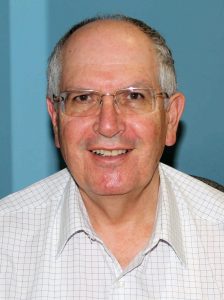Vienna to Host RARE2019 Meeting on Rare Diseases

Vienna, Austria's capital, will host RARE2019, set for March 4-5. (Photo by Larry Luxner)
About 100 scientists, researchers, pharmaceutical executives, and others will converge on Austria’s capital city early next month for the 2nd International Congress on Advanced Treatments in Rare Diseases.
The March 4-5 meeting, to take place at the Hilton Am Stadtpark Vienna, features 27 speakers on a variety of disorders ranging from spinal muscular atrophy (SMA) to Parkinson’s disease. Nearly a third of the speakers are from Israel, including conference chair Ari Zimran, MD, director of the Gaucher Clinic at Jerusalem’s Shaare Zedek Medical Center.
“Gaucher is an amazing model for rare diseases, because even though here in Israel it’s far more common — occurring in about one in 850 Ashkenazi Jews — it behaves like a typical rare disease in that there is no awareness,” Zimran said in a phone interview with Bionews Services, which will cover the Vienna conference on behalf of this website. “The doctors, even if they’ve heard about it, are unlikely to consider it because, in medicine, that’s the way we’ve been educated.”
Zimran — whose clinic has grown since its founding in 1990 to become the world’s largest specialized facility for treating Gaucher disease — said many topics on the agenda in Vienna will be of generic interest, such as the design of clinical trials; funding for research; digital health; ethical aspect of rare diseases, and the role of biobanking and big data in healthcare.
“Doctors often don’t think about rare diseases,” Zimran said. “Only 5 percent of the 7,000 known rare diseases have effective treatments, but the tragedy of delayed diagnosis is not only for those 5 percent of cases — where it causes the development of irreversible disease complications that impact the patient’s quality of life — but also for the 95 percent of rare diseases where treatment is not available.”
He added: “These diseases are usually genetic, and by the time you diagnose the patient, very often another affected sibling is born. If you did the diagnosis on time, you could have prevented the birth of another patient with the same disease.”
One such disease, SMA, will be the focus of a talk by German neurologist Arndt Rolfs, MD, the founder and CEO of Centogene. His presentation, “Spinal muscular atrophy: One rare disease with different innovative treatments,” will touch on clinical and genetic aspects of SMA, as well as Spinraza (nusinersen) as a treatment for the neuromuscular disorder.
Thomas Stulnig, MD, a specialist in internal medicine and a frequent lecturer, will speak on rare metabolic diseases in Austria, while pediatric endocrinologist Michael P. Wajnrajch, MD, of Pfizer, will share his views on challenges to drug development from the corporate perspective.
Varda Shalev, MD, is director of Israeli health network Maccabitech. She’ll talk about biobanking and big data for rare diseases.
Germany’s Michael Beck, MD, will present an analysis of study designs for rare diseases, for which the standard placebo-controlled, double-blind clinical trial is often inappropriate. And Uma Ramaswami, MD, a consultant with the Lysosomal Disorders Unit at London’s Royal Free Hospital, will talk about helping patients to transfer from pediatric hospitals to the adult clinic.
Madeline Collin, a 24-year-old British woman with Gaucher disease, will discuss mental health in rare diseases and living with an uncertain future.
“From very early on in my journey, my parents were told I would not live long enough to see adulthood. This, of course, was not true, nor was it an isolated incident,” Collin said in a written summary of her presentation. “Despite the advances in awareness and diagnostic technology, some parents, patients and their families are still given the wrong diagnoses or face a delay in diagnosis. This is perhaps why mental health is such a serious issue for patients with rare diseases.”
Two presentations on gene therapy are also planned. The first is by Gabriel Cohn, MD, vice president of clinical development at Boston-based Avrobio, on “Ex-vivo lentiviral vector-mediated gene therapy in rare diseases.” The second will be given by Olga Uspenskaya-Cadoz, MD, PhD, of Prevail Therapeutics, on “In-vivo, AAV9-based gene therapy for Parkinson’s disease with pathogenic GBA1 mutations.”
The two-day event wraps up with a special lecture by Avraham Steinberg, MD, associate clinical professor of medical ethics at Hebrew University-Hadassah Medical School in Jerusalem, on ethical aspects in rare disease such as distributive justice and the value of life.
In addition, conference organizers will present awards to the top three submitted abstracts.
This is the second international congress of its type; the first, RARE2018, took place last year in London. In addition, the American Conference on Advanced Treatments in Rare Disease is planned for June 13-14 in East Brunswick, New Jersey. The following week, Centogene will sponsor its June 20-22 Recent Advances in Rare Diseases conference in Bogotá, Colombia.








